Category / REF Subjects
ESRC: Miracles in the mundane: hitchhiking and micro-adventures
As as part of the ESRC Festival of Social Science 2017, organised by Bournemouth University, I ran an event about hitchhiking and micro-adventures. You may wonder, when did the practice of hitchhiking need to be thought through social science. By inviting six speakers (hitchhikers and social scientists) to Bournemouth University, we spent 3 hours thinking with and through hitchhiking and micro adventures to explore the modern experiences of passengering, ethical encounters, trust, the cost of speed and acceleration, driverless cars, social entrepreneurship, self-sufficiency, automobility and infrastructure. Other Topics Included –
- Hitchhiking and the nature of being a passenger (agency, performances and resistance to standardized categories);
- Contrasted affects, bodies and emotions of being on the road;
- Role of media and social media in accessibility, inclusion, and diversity of micro adventures;
- Systems, technologies and practices linked to friction/ frictionless travel;
- The move back towards so-called ‘active’ and human powered mobility cultures that gives value to turbulence, friction, risk and the social exchange they engender;
- The future of hitchhiking.
- The role of gender, race, class, age and sexuality and other social and intersectional relationships of domination at play;
- Understanding and potentially overcoming physical, mental, emotional barriers to microadventures;
- Hitchhiking as Sustainable, Subversive Mobilities, Slow Mobilities;
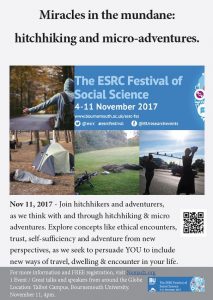
Poster for the Event
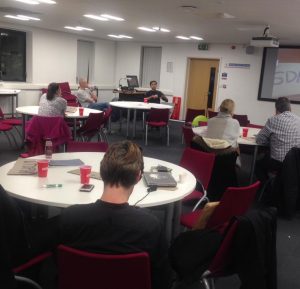
Ali Hussain presenting.

This event was FREE to attend, and was superbly supported by Natt & Devon at the University. The event was attended by approx. 20 people and was shown LIVE on twitter and Facebook. The experience of been part of the ESRC festival of Social Science was a very positive one. It has provided a public engagement opportunity, helped me engage with new research partners, and provided more inside into an under researched phenomenon. It has also led to discussions about organizing an event with similar topic areas in 2018.
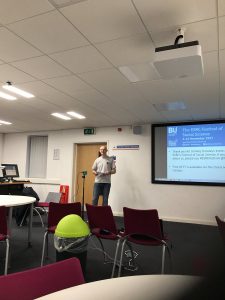
Organizer Michael O’Regan, Faculty of Management
For further information please contact FestivalofSocialScience@bournemouth.ac.uk or please visit the event website at nomadx.org
The slow process from public health research to law
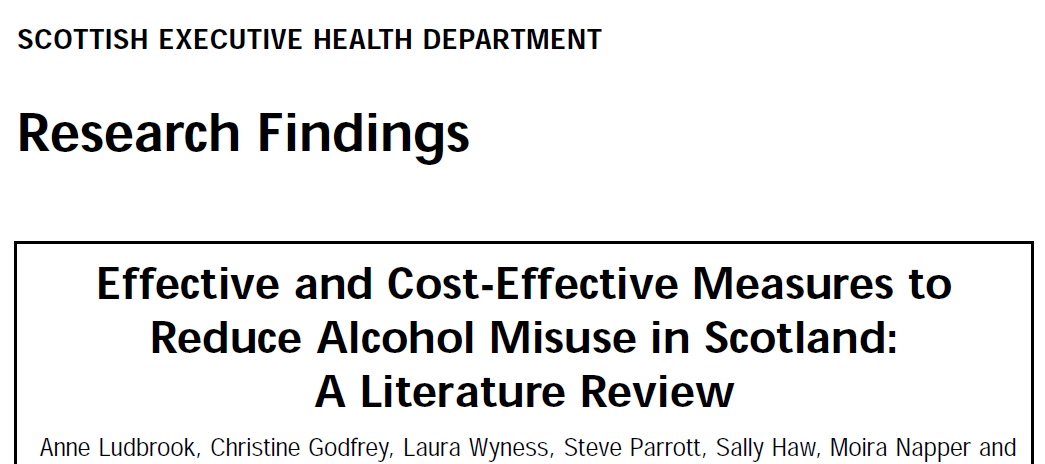 We know that public health works and thinks long-term. We’ll typically see the population benefits of reducing health risks such as tobacco use, obesity and high alcohol intake in ten or twenty years’ time. But we often forget that preceding public health research into the determinants of ill health and the possible public health solutions is also slow working. Evidence-based public health solutions can be unpopular with voters, politicians or commercial companies (or all). Hence these take time to get accepted by the various stakeholders and make their way into policies.
We know that public health works and thinks long-term. We’ll typically see the population benefits of reducing health risks such as tobacco use, obesity and high alcohol intake in ten or twenty years’ time. But we often forget that preceding public health research into the determinants of ill health and the possible public health solutions is also slow working. Evidence-based public health solutions can be unpopular with voters, politicians or commercial companies (or all). Hence these take time to get accepted by the various stakeholders and make their way into policies.
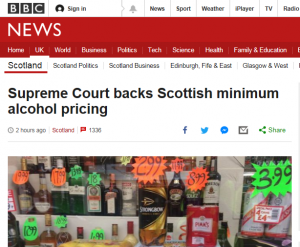 I was, therefore, glad to see that Scotland won the Supreme Court case today in favour of a minimum price for a unit of alcohol. As we know from the media, the court case took five years. Before that the preparation and drafting of the legislation took years, and some of the original research took place long before that. Together with colleagues at the Health Economic Research Unit at the University of Aberdeen, the University of York and Health Education Board for Scotland, we conducted a literature review on Effective & Cost-Effective Measures to Reduce Alcohol Misuse in Scotland as early as 2001 [1]. Some of the initial research was so long ago it was conducted for the Scottish Executive, before it was even renamed the Scottish Government.
I was, therefore, glad to see that Scotland won the Supreme Court case today in favour of a minimum price for a unit of alcohol. As we know from the media, the court case took five years. Before that the preparation and drafting of the legislation took years, and some of the original research took place long before that. Together with colleagues at the Health Economic Research Unit at the University of Aberdeen, the University of York and Health Education Board for Scotland, we conducted a literature review on Effective & Cost-Effective Measures to Reduce Alcohol Misuse in Scotland as early as 2001 [1]. Some of the initial research was so long ago it was conducted for the Scottish Executive, before it was even renamed the Scottish Government.
Prof. Edwin van Teijlingen
CMMPH
Reference:
Research started years ago! Ludbrook et al.(2002) Effective & Cost-Effective Measures to Reduce Alcohol Misuse in Scotland: Lit Review, HERU, Univ. of Aberdeen. [ISBN: 0755932803] http://www.gov.scot/Resource/Doc/1124/0052548.pdf
Upcoming conference: Rethinking the Business to Business (B2B) label
B2B marketing is an important sector in social sciences and relevant to many academics and practitioners. The B2B label has become out-dated; lacks focus, clarity and accuracy as a descriptive classification; and fails to inspire interest and enthusiasm. This event calls on marketers to rethink the B2B label by engaging relevant stakeholders: researchers, practitioners and educators, in an in-depth conversation on what B2B means today.

4th B2B colloquium – welcome talk by Dr Kaouther Kooli
Led by Dr Kaouther Kooli academics from the Department of Marketing, Faculty of Management (BU) and Professor Merlin Stone from St Mary’s University are co-organising a conference aimed at rethinking the Business to Business label. This event calls on marketers to rethink the B2B label by engaging relevant stakeholders: researchers, practitioners and educators, in an in-depth conversation on what B2B means today.
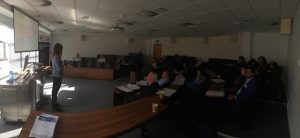
4th B2B colloquium – parallel session
The conference is taking place on 18thDecember 2017 at St Mary’s University Twickenham. The half day event will engage the B2B community (researchers, practitioners and educators) in an in-depth conversation on B2B marketing with the aim to define what B2B is and exchange new ideas about how to advance academic and practitioner thinking in this area.
Guest speakers include Professor Merlin Stone, Professor Len Tiu Wright (University of Huddersfield) and a senior B2B practitioner.
Round tables will be facilitated by Dr Kaouther Kooli, Dr Julie Robson and Dr Elvira Bolat, all of Bournemouth University and specialists in B2B marketing. A detailed programme can be downloaded in here.
Attendance is free. We are welcoming all academics, PhD candidates, UG and PG students as well as practitioners.
If you wish to attend, please confirm your attendance via email at merlin.stone@stmarys.ac.uk
Location: St Mary’s University, Twickenham, London. For instructions about getting to St Mary’s, see https://www.stmarys.ac.uk/contact/directions.aspx.
In that past three years, the B2B SIG (Academy of Marketing) has published two special issues in Journal of Customer Behaviour and Journal of Business and Industrial Marketing, featuring academic and practitioners’ research. At the moment Dr Kaouther Kooli is preparing new special issue for the Journal of Business to Business Marketing. If you wish to benefit from such amazing publishing and networking opportunities, do become a member of the SIG by emailing at kkooli@bournemouth.ac.uk or ebolat@bournemouth.ac.uk.
Exploring Plankton Diversity in Southampton Water
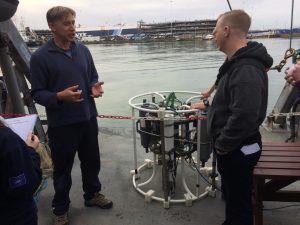 Undergraduate students in the department of Life and Environmental Sciences investigated the diversity of phytoplankton and zooplankton in Southampton water as part of their third-year Biological Oceanography module. Using the research vessel RV Callista at the National Oceanography Centre Southampton (NOCS), samples were collected at 5 locations, or “stations”, between Calshott and the Itchen River. Environmental data was collected at each station using an array of sensors, measuring parameters such as temperature, salinity, chlorophyll and oxygen concentration. Phytoplankton were collected at two depths at each site, representing deep and shallow water. Zooplankton was caught using a plankton net, with a 120µm mesh to catch zooplankton in the net. These samples were subsequently analysed back at the university.
Undergraduate students in the department of Life and Environmental Sciences investigated the diversity of phytoplankton and zooplankton in Southampton water as part of their third-year Biological Oceanography module. Using the research vessel RV Callista at the National Oceanography Centre Southampton (NOCS), samples were collected at 5 locations, or “stations”, between Calshott and the Itchen River. Environmental data was collected at each station using an array of sensors, measuring parameters such as temperature, salinity, chlorophyll and oxygen concentration. Phytoplankton were collected at two depths at each site, representing deep and shallow water. Zooplankton was caught using a plankton net, with a 120µm mesh to catch zooplankton in the net. These samples were subsequently analysed back at the university.
Trawls and grab samples were also used to investigate the benthic (bottom dwelling) communities living on the seabed and to 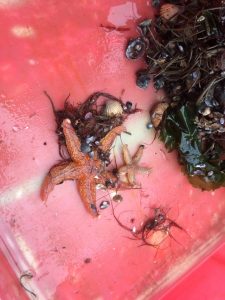 analyse the oxygen conent of the sediment. Benthic animals found included starfish, fish such as gobies and flounders, cuttlefish, crabs and ‘moss animals’ (bryozoans).
analyse the oxygen conent of the sediment. Benthic animals found included starfish, fish such as gobies and flounders, cuttlefish, crabs and ‘moss animals’ (bryozoans).
Back at BU, the phyto- and zooplankton samples were analysed using microscopy. A variety of diatoms and dinoflagellates were found in the phytoplankton samples, and barnacle larvae, copepods and the larvae of marine worms were found in the zooplankton samples. Microbes too small to be seen under the microscope were counted using flow cytometry, a technique used to identify cyanobacteria and other minute cells.
The study demonstrated the great diversity of planktonic and benthic life in Southampton water, and highlighted the importance of monitoring and understanding the microscopic life of the sea since the microscopic life , as the base of the food web, is crucial in sustaining the larger and better understood forms of marine life.
BU welcomes the ERASMUS+ Research Team
On the 25th-27th October 2017, Dr Ben Hicks (Psychology and ADRC) and Professor Wen Tang (Department of Creative Technology) welcomed the ERASMUS+ project team to Bournemouth University. The team consisted of practitioners based at Alzheimer’s Valencia, Alzheimer’s Greece, Alzheimer’s Slovenia, Alzheimer’s Romania and IBV. Since October 2016, thanks to funding from the European Commission, the team has been developing an e-training platform to promote the use of Serious Games with people with dementia. This meeting-the third since the project began- enabled the research team to present the work they had been undertaking within their associated countries and discuss the next stages of the project. This included:
- Selecting and evaluating a range of Serious Games with people with dementia and their care partners;
- Creating guidance information on using the Serious Games; and
- Developing training materials for health practitioners wishing to use the e-training platform
The e-training platform is beginning to take shape, although the training materials are not yet publically available. If you would like to access the web platform it can be found at: http://adgaming.ibv.org/
Although the meetings were long (and the discussions incredibly fruitful), the research team still had time to visit BU facilities and live the student experience for a day. This included having lunch within the Fusion Building canteen, undertaking Virtual Reality Navigational testing within the Psychology labs and buying two-for-one pints in Dylans at the end of the day!
The next project meeting will take place in Bucharest, Romania, in February 2018, where plans to disseminate and evaluate the training delivered to health practitioners will be discussed.

Welcoming the research team

The meetings begin

Experiencing student life at Dylans
ESRC Festival – Weekend fun outdoors

O n Sunday BU and RSPB staff along with volunteers from SUBU enjoyed hearing what young people under 12 years old thought about about being outdoors.
n Sunday BU and RSPB staff along with volunteers from SUBU enjoyed hearing what young people under 12 years old thought about about being outdoors.
The research team welcomed over 60 children to the KingFisher Barn to take part in this ESRC Festival of Social Sciences event. There were various outdoor activities for the young people to try including den building in the woods. Many of the fun activities also gave young visitors the opportunity to share their ideas about the importance of spending time outdoors playing with friends or family. Many of the young visitors added their ideas to the event’s ‘Big ideas Trees’. There was also the chance for them to suggest how green spaces could be improved to make them more attractive as places to play. Not all the data has been analysed yet but it would seem for the under 5’s one popular enhancement to any green space would be more muddy puddles!
Natalia Adamczewska joins the HEIF-6 Virtual Learning Environment project
 Recently, I was fortune enough to become the Research Assistant on the HEIF-6 project run by Dr Ben Hicks. This is a one year project that aims to develop and evaluate a free Virtual Learning Environment tool that will support practitioners and care home staff wishing to use commercial gaming technology (iPads, Nintendo Wii) with people with dementia and their care partners. We have a number of experts involved in the research, such as Dr Samuel Nyman from Psychology Department and ADRC, Professor Wen Tang from Department of Creative Technology, Dr Sarah Thomas who is Deputy Director BUCRU and Dr Clare Cutler who is Research Skills and Development Officer. We also collaborate with Alive! who are a charity dedicated to improving the lives of older people and people with dementia through delivering innovative activities (e.g. the use of technology) and training dementia care practitioners. They work with 350 Care Homes and Day Centers across the South West of England and we are lucky to have Malcolm Burgin onboard who as the Regional Manager of Alive!.
Recently, I was fortune enough to become the Research Assistant on the HEIF-6 project run by Dr Ben Hicks. This is a one year project that aims to develop and evaluate a free Virtual Learning Environment tool that will support practitioners and care home staff wishing to use commercial gaming technology (iPads, Nintendo Wii) with people with dementia and their care partners. We have a number of experts involved in the research, such as Dr Samuel Nyman from Psychology Department and ADRC, Professor Wen Tang from Department of Creative Technology, Dr Sarah Thomas who is Deputy Director BUCRU and Dr Clare Cutler who is Research Skills and Development Officer. We also collaborate with Alive! who are a charity dedicated to improving the lives of older people and people with dementia through delivering innovative activities (e.g. the use of technology) and training dementia care practitioners. They work with 350 Care Homes and Day Centers across the South West of England and we are lucky to have Malcolm Burgin onboard who as the Regional Manager of Alive!.
Being part of such a research team, and having the chance to contribute to the HEIF-6 project is a great privilege and will certainly be beneficial as I begin my journey as an early career researcher.
If you would like further information on the project, please feel free to email Ben on bhicks@Bournemouth.ac.uk
Concert of music for cello and electronics at BU
On Wednesday 1st November 2017 guest artists Alice Edridge, Chris Kiefer, Thomas Gardner and Laura Reid featured alongside BU’s Tom Davis for a concert of music for cello and electronics in the Allsebrook Lecture Theatre, Talbot Campus.
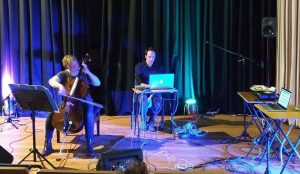 Organised by Dr Ambrose Seddon (Creative Technology; EMERGE), the programme included The Feral Cello performance system developed by Tom Davis (Creative Technology; EMERGE), for which composer/cellist Laura Reid has created a new work, Gemmeleg (2017). Tom’s system incorporates machine listening and actuated feedback to alter the response of an acoustic cello in real time during a performance.
Organised by Dr Ambrose Seddon (Creative Technology; EMERGE), the programme included The Feral Cello performance system developed by Tom Davis (Creative Technology; EMERGE), for which composer/cellist Laura Reid has created a new work, Gemmeleg (2017). Tom’s system incorporates machine listening and actuated feedback to alter the response of an acoustic cello in real time during a performance.
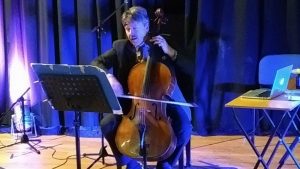
Thomas Gardner (London College of Communication) performed his work Lipsync (2006), for cellist, lips, and 6 channel live electronics. His composition explores various levels of synchronisation between action and speech, poetic idea and sonic image, acousmatic sound and live instrumental performance.
Finally, Alice Eldridge and Chris Kiefer (University of Sussex) performed with modified cellos featuring transducers, sensors, loudspeakers and electronic controllers mounted onto and into the bodies of their instruments. Audience members had the opportunity to get close to the modified cellos after the concert and talk with all the composers and performers.
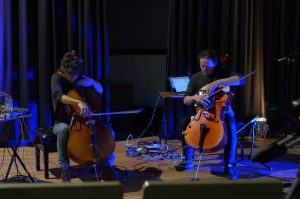
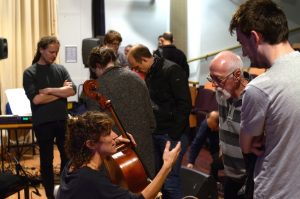
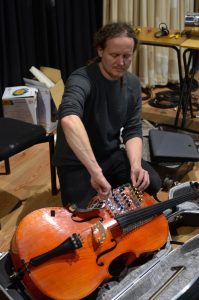
ESRC Festival event: Me and my green space
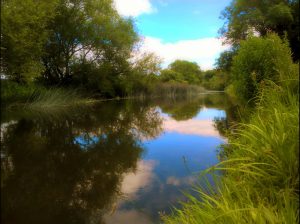
On Sunday the Kingfisher Barn, Muscliffe will be the venue for an ESRC Festival event. BU staff from the Faculties of Health and Social Sciences and Media and Communications have developed the event in collaboration with the RSPB and Bournemouth Borough Council Parks. The event called Me and my green space is aimed at young people aged 12 years and under. There will a range of activities to help open a dialogue with younger visitors about what they think green spaces are, do they use them during play and if so what type of activities they like to do in the green spaces they visit. The research team is also interested in whether the young people have ideas about improving access to green spaces or any thoughts about how these areas could offer more enjoyment to younger visitors. The activities on offer will be den building, arts and crafts based on natural materials, an arboretum trail and river dipping. SUBU are helping to support the delivery of several of these activities. The event will end with a lantern trail to light up the woodland area around the Kingfisher Barn. All the research team – Holly Crossen-White, Angela Turner-Wilson (HSS), Annie East and Nathan Farrell (FMC) – invite you to come along and enjoy some outdoor fun – and the weather is going to be good too!
BU Senior Academic Appointed As Research Fellow In The Centre For Military Studies, Faculty of Military Science at Stellenbosch University, RSA
Public talk “Performance in pairs: Human minds acting together” is coming up!
Performance in pairs: Human Minds acting together
Wednesday 8th November, 6:30-8:30pm
KG01, Talbot Campus, Bournemouth University
My PhD student, Juan Camilo Avendaño Diaz, and I are running an interactive talk in collaboration with the ESRC Festival of Social Science to explore recent research findings in psychology suggesting that our cognitive functions and behaviour could be shaped by another person who performs similar tasks next to us. During this talk, we will introduce some of these scientific findings and the theories behind, along with their potential implications for our everyday life. You will also have the chance to see psychological experiments in action, and to try some of them on-site.
The ESRC Festival of Social Science offers a fascinating insight into some of the country’s leading social science research and how it influences our social, economic, and political lives. Bournemouth University are running 11 fascinating events including debates, workshops, virtual exhibitions and much more!
To find out more about this event and to book yourself a ticket, please go to this website: https://research.bournemouth.ac.uk/esrc-fss/. To book a ticket for the “performance in pairs” talk, check out this webpage: https://www.eventbrite.co.uk/e/performance-in-pairs-human-minds-acting-together-tickets-36890618834. Please share this event with anyone you feel may benefit from getting involved, or anyone you know who has an interest in the topic!
Hope to see you there!
Xun He
Senior Lecturer in Psychology
CMMPH student wins The Postgraduate Research Prize
Ms. Sheetal Sharma who will be graduating from Bournemouth University with a Ph.D. on November 10th has been awarded Bournemouth University’s The Postgraduate Research Prize. This prize is for the postgraduate student whose achievement is deemed by the Vice-Chancellor to have been most outstanding in their time at BU.
Sheetal stood out as a Ph.D. student as her maternal health research project in Nepal resulted in several many publications [1-6], some in very prestigious journals such as BMC Pregnancy & Childbirth [4] and PLOSOne [5] . She won the best poster prize at the international GLOW conference in Birmingham in 2013 with the poster presentation ‘Getting women to care in Nepal: A Difference in Difference analysis of a health promotion intervention’. She won a SBSP travel scholarship to present a poster at the 8th European Congress on Tropical Medicine & International Health in 2013 in Denmark. Sheetal’s abstract of the poster was also officially published [7].
Sheetal presented at the Science in Society conference (SiS) at Berkeley University in November 2012 where she received a Graduate Scholar Award. In addition, she won a Santander travel scholarships for £5,000 to learn about research at the University of Buenos Aires, Institute for Clinical Effectiveness & Health Policy (Argentina) and at the University of Barcelona in Spain. This scholarship resulted in a great publication with the world-famous researcher in reproductive health care prof. Jose Belizan as co-author. Sheetal also presented her work at the first ever national health promotion conference in Nepal.
Sheetal also had less academic achievements as she won the BU photo competition at the 2014 PGR conference with the photo in this blog. 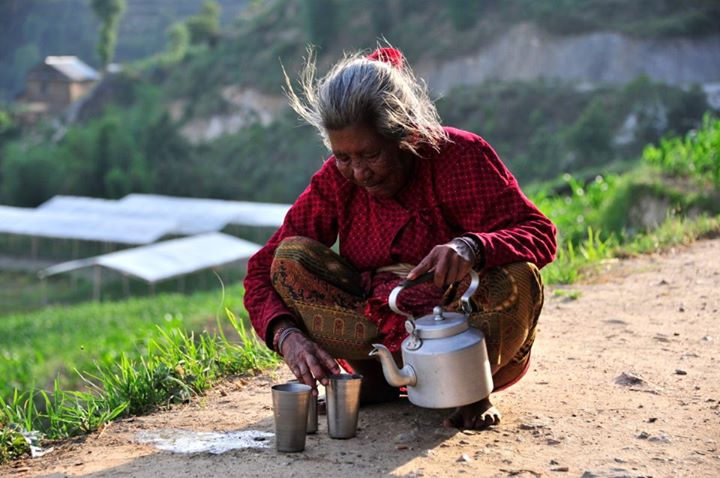
Sheetal was also actively involved as a student representative in the Faculty of Health & Social Sciences as well as in the Graduate School. She even found time to join the editorial board of the newly formed Journal of Asian Midwives.
Over the past five years Sheetal has had many mentions on this BU research blog as one of BU’s most prolific publishing PhD students.
As supervisors and co-authors we are proud of her!
Dr. Catherine Angell, Prof. Vanora Hundley & Prof. Edwin van Teijlingen (CMMPH)
BU Visiting Professor Padam Simkhada, Liverpool John Moores University
Dr. Elisa Sicuri, Assistant Research Professor at ISGlobal, Spain
Prof. Jose Belizan, University of Buenos Aires, Argentina
References to published work by Sheetal Sharma:
- Joshi, R., Sharma, S., van Teijlingen, E. (2013) Improving neonatal health in Nepal: Major challenges to achieving Millennium Development Goal 4, Health Science Journal 7(3): 247-257. http://www.hsj.gr/index.files/Page1421.htm
- Sharma, S., Joshi, P., van Teijlingen, E. (2015) ‘Nepenglish’ or ‘Nepali English’: A new version of English? Asian Journal of Humanities & Social Sciences 4(2): 188-193. www.ajssh.leena-luna.co.jp/AJSSHPDFs/Vol.4%282%29/AJSSH2015%284.2-21%29.pdf
- Simkhada, B., Sharma, S., van Teijlingen, E., Silwal, RC, Simkhada, P. (2015) Exploring Maternal Mortality Reduction. In: Wasti, SP, Simkhada, PP, van Teijlingen, E. (Eds.) The Dynamics of Health in Nepal, Kathmandu: Social Science Baha & Himal Books: 95-121.
- Sharma, S., van Teijlingen, E., Belizán, J.M., Hundley, V., Simkhada, P., Sicuri, E. (2016) Measuring What Works: An impact evaluation of women’s groups on maternal health uptake in rural Nepal, PLOS One 11(5): e0155144 http://journals.plos.org/plosone/article?id=10.1371%2Fjournal.pone.0155144
- Sharma, S., van Teijlingen, E., Hundley, V., Angell, C., Simkhada, P. (2016) Dirty and 40 days in the wilderness: Eliciting childbirth and postnatal cultural practices and beliefs in Nepal BMC Pregnancy & Childbirth 16: 147 https://bmcpregnancychildbirth.biomedcentral.com/articles/10.1186/s12884-016-0938-4
- Sharma, S, Simkhada, P, Hundley, V, van Teijlingen E., Stephens, J, Silwal, RC, Angell, C (2017) Evaluating a Community Maternal Health Programme: Lessons Learnt. Journal Asian Midwives 4(1):3–20.
- Sharma, S., van Teijlingen, E., Hundley, V., Stephens J., Simkhada, P., Angell, C., Sicuri, E., Belizan, J.M. (2013) Mixed-methods evaluation of a maternity care intervention in rural Nepal: measuring what works, Poster P.2.3.004 (A), Tropical Medicine & International Health 18 (Suppl. 1): 108–231.
NIHR Grant Applications Seminar & Support event – last chance to book
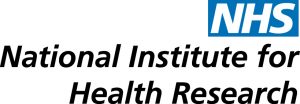
Are you planning to submit a grant application to NIHR?
Research Design Service South West (RDS-SW) are holding a one day event on 9 November 2017 at Plymouth Science Park, Devon.
Last few days to book!
The events consists of:
- a morning seminar session which is open to anyone to come and RDS advisers give presentations on what makes a good grant proposal.
- an afternoon support session of one-to-one appointments which is for those who would like to discuss their own proposal with an RDS adviser. Those interested in this opportunity will be asked to supply in advance a brief description of their project idea.
Registration is FREE and lunch will be provided. Places are limited and will be allocated on a ‘first come, first served’ basis. In order to secure a place at one of these events, delegates will need to complete the online registration form by 1pm 30 October 2017. One-to-one appointments need to be booked in advance by selecting the appropriate option on the registration form.
You can find out more here
Don’t forget your local branch of the NIHR Research Design Service is based within the BU Clinical Research Unit (BUCRU) on the 5th floor of Royal London House. Feel free to pop in and see us, call us on 61939 or send us an email.
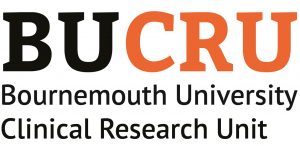
FHSS student needs help with online questionnaire for her research
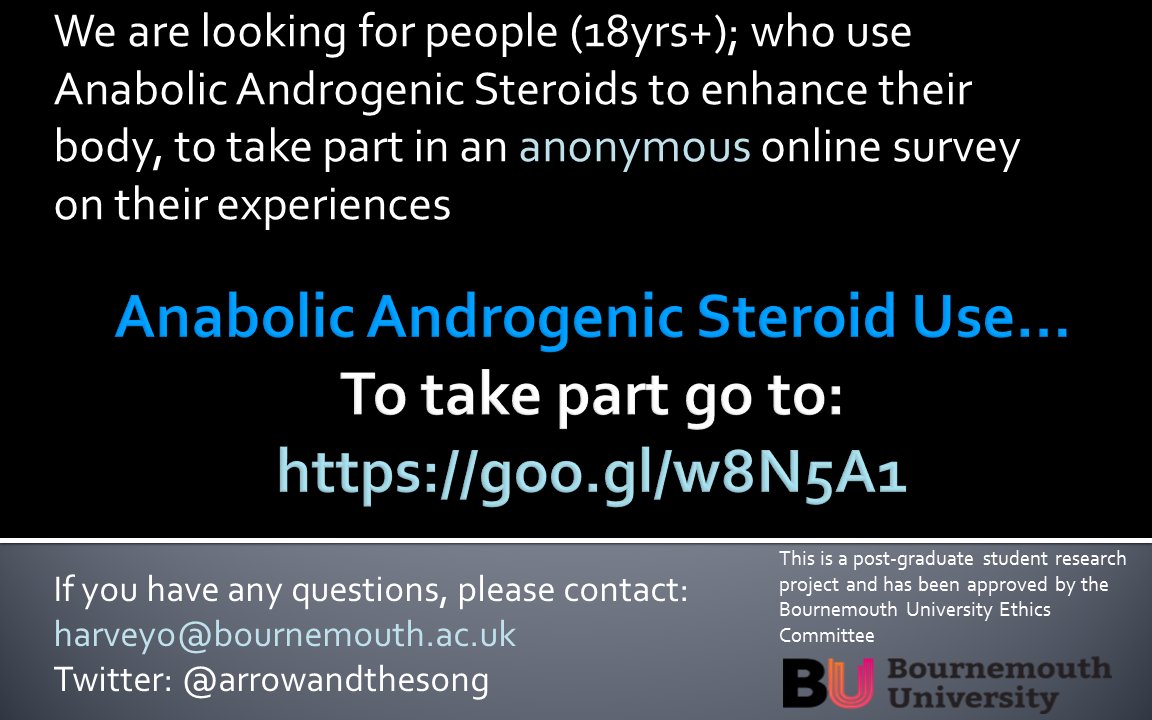 Our PhD student Orlanda Harvey is currently conducting her study on why people use Anabolic Androgenic Steroids (AAS). Since steroid use is a sensitive topic and its users are a hard-to-reach population we need as much help as we can get to get her survey distributed to as many as possible potential steroid users (aged 18 and over). We, as her PhD supervisors, would like to ask you to alert friends, family, neighbours, health care professionals working with this target group, etc. to the existence of this survey. Her questionnaire is available in paper version (from harveyo@bournemouth.ac.uk or telephone Edwin van Teijlingen at: 01202-961564). However, the easiest and most anonymous way would be for people to complete it online using the following online link.
Our PhD student Orlanda Harvey is currently conducting her study on why people use Anabolic Androgenic Steroids (AAS). Since steroid use is a sensitive topic and its users are a hard-to-reach population we need as much help as we can get to get her survey distributed to as many as possible potential steroid users (aged 18 and over). We, as her PhD supervisors, would like to ask you to alert friends, family, neighbours, health care professionals working with this target group, etc. to the existence of this survey. Her questionnaire is available in paper version (from harveyo@bournemouth.ac.uk or telephone Edwin van Teijlingen at: 01202-961564). However, the easiest and most anonymous way would be for people to complete it online using the following online link.
Thank you very much in advance!
Dr. Margarete Parrish
Dr. Steven Trenoweth
Prof. Edwin van Teijlingen
Congratulations to James Palfreman-Kay
 Congratulations to BU’s Equality and Diversity Adviser James Palfreman-Kay whose application to HEFCE’s ‘Catalyst Fund: Tackling hate crime and online harassment on campus‘ has been successful. He is one of 40 academic recipients of funding at universities and colleges throughout England. Applications have been assessed by a panel of HEFCE staff and external experts from across relevant areas of knowledge particular to student safeguarding.
Congratulations to BU’s Equality and Diversity Adviser James Palfreman-Kay whose application to HEFCE’s ‘Catalyst Fund: Tackling hate crime and online harassment on campus‘ has been successful. He is one of 40 academic recipients of funding at universities and colleges throughout England. Applications have been assessed by a panel of HEFCE staff and external experts from across relevant areas of knowledge particular to student safeguarding.
Congratulations!
Prof. Edwin van Teijlingen
CMMPH
Hidden Microbes in Christchurch House “Pond”
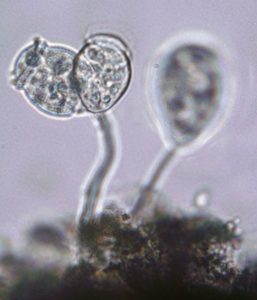 Microscopic investigations of water samples from the half-barrel pond in Christchurch House courtyard have revealed a menagerie of single-celled life. These tiny organisms (smaller than one tenth of a millimetre) are incredibly important as they form the basis of food webs. They also play a major role in maintaining water quality as they feed on bacteria, and stalked species such as Vorticella (image) are responsible for their removal in waste-water treatment plants. The half-barrel “pond” may be almost as small as its inhabitants but it promises to become a treasure of local ‘hidden’ biodiversity!
Microscopic investigations of water samples from the half-barrel pond in Christchurch House courtyard have revealed a menagerie of single-celled life. These tiny organisms (smaller than one tenth of a millimetre) are incredibly important as they form the basis of food webs. They also play a major role in maintaining water quality as they feed on bacteria, and stalked species such as Vorticella (image) are responsible for their removal in waste-water treatment plants. The half-barrel “pond” may be almost as small as its inhabitants but it promises to become a treasure of local ‘hidden’ biodiversity!
For further information please contact Genoveva F. Esteban gesteban@bournemouth@ac.uk, Jack Dazley i7447079@bournemouth.ac.uk, or Damian Evans devans@bournemouth.ac.uk
SAIL Project Team Meeting
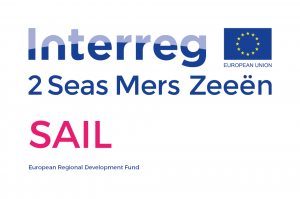
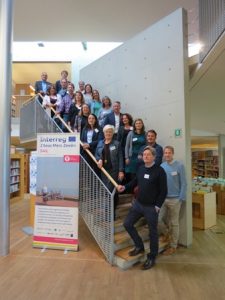
Last week, Prof Ann Hemingway, Prof Adele Ladkin and Dr Holly Crossen-White joined European research colleagues in Ostend, Belgium for a SAIL Project bi-annual team meeting. Over two days all research partners from four different European countries had the opportunity to share their initial research data from pilot projects being developed within each country for older people. The BU team will be undertaking the feasibility study for the SAIL project and will be drawing together all the learning from the various interventions created by the other partners.












 April’s Café Scientifique – Should we help machines understand and respond to our emotions?
April’s Café Scientifique – Should we help machines understand and respond to our emotions? Postgraduate Research Experience Survey (PRES) 2024 – 2 WEEKS LEFT
Postgraduate Research Experience Survey (PRES) 2024 – 2 WEEKS LEFT Working with The Conversation: online training session – Wednesday 8th May
Working with The Conversation: online training session – Wednesday 8th May Apply for up to £1,000 to deliver an event and take part in a national festival of public engagement with research
Apply for up to £1,000 to deliver an event and take part in a national festival of public engagement with research MSCA Postdoctoral Fellowships 2024
MSCA Postdoctoral Fellowships 2024 Horizon Europe News – December 2023
Horizon Europe News – December 2023